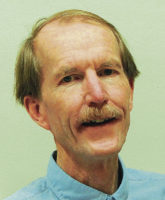 MEEKER | In previous articles I summarized the facts of global climate change and evidence for its effects in the White River drainage. The trend is toward higher temperatures and increasingly drier conditions. We are at significant risk for ecosystem collapse, severe disruption of the food supply, adverse health consequences from extreme heat events and emerging infectious diseases, and increased damage to infrastructure from severe weather events. What can we do?
MEEKER | In previous articles I summarized the facts of global climate change and evidence for its effects in the White River drainage. The trend is toward higher temperatures and increasingly drier conditions. We are at significant risk for ecosystem collapse, severe disruption of the food supply, adverse health consequences from extreme heat events and emerging infectious diseases, and increased damage to infrastructure from severe weather events. What can we do?
The short answer is: transition to a sustainable carbon neutral economy. The good news is that we are already in the midst of economic transition. Renewable technologies now offer economic alternatives to fossil fuel energy sources, and employment in solar energy has surpassed employment in both natural gas and coal (Department of Energy, 2017). The bad news is that the global economic transition is far larger than the energy sector alone, and many traditional jobs are at risk—not just in the energy sector and not just because of the advent of renewables, but because of economic dislocations comparable to the industrial revolution two centuries ago.
We are living in times of unprecedented economic change.
The world economy is transitioning from human labor to robotics and artificial intelligence systems. (See e.g. Anthes, 2017, and Rotman, 2013.) Robots replace line workers in automobile assembly lines. Automated loaders, automated drilling machines, self-driving trucks and other equipment replace mine workers. Digital recognition software now out-performs trained dermatologists in recognizing skin cancer. And on and on, economic sector after sector, one job after another. For the first time since the industrial revolution, productivity is increasing faster than wages, which have been essentially flat for the past twenty years in the U.S., and economic inequality is widening. Corporations reap the profits of more efficient technologies, leaving workers with lower-paying jobs—or no jobs at all.
We’ve seen it before, in the historical record. For example, among other disruptions the Industrial Revolution in Britain displaced thousands of home spinners. Steam-driven spinning machines were far more efficient, and cheaper, than the cottage industry. That sent thousands of home spinners, especially women, into poverty. Market driven capitalism does that. Is it right? Is it fair? Society has to figure out how cushion such economic dislocation, if that’s our choice of economy. (And, we should point out, centrally planned economies in communist Russia and Eastern Europe did a whole lot worse, by all measures, than the West.)
Point is, it’s not all tree-huggers and wild-hair environmentalists closing down coal mines. If gas-fired power plants are more efficient and cost less than coal, natural gas takes a greater share of the market. And if land-based wind farms generate electricity more cheaply than gas-fired power plants, wind-generated power takes more of the market from gas. (For cost comparison on all of these, gas vs. coal vs. wind vs. solar, see U.S. EIA, 2018.) Then the problem becomes: how to care for and provide meaningful employment for displaced workers? Same problem as 200 years ago, but on a much bigger scale. It’s not clear we’re any smarter how to solve it, but there certainly are more opportunities today than there were then.
Now pile on the economic impacts of climate change. Costs to the U.S. economy attributable to damage from events related to climate change, especially extreme weather and wildfires, exceeded $300 billion last year, and the overall figure doesn’t measure individual suffering of the many thousands of people who have lost homes and livelihood (Gramling, 2018). The fourth National Climate Assessment projects that if we continue business as usual, costs of climate change to the U.S. economy will exceed 10 percent of GDP by the end of the century (USGCRP, 2018). That would be $2 trillion, roughly, today—a little over half the present federal budget.
Driving climate change and economic disruption is human population growth. It is simply not sustainable. There were one billion people on the planet in 1800. One and a half billion in 1900. Three billion in 1950, a doubling time of 150 years. Six billion in 2000, a doubling time of 50 years. Seven-point-seven billion now, and on track to reach 10 billion by 2050 (UNDP, 2017). We use about 1.7 times more renewable resources, e.g. fish and forestry products, than nature can replenish (Global Footprint Network, 2018).
Things have to change. We can, as a society, decide to build a sustainable system. Or we can anticipate economic and social collapse.
Mitigation requires a new energy economy.
We are making progress toward sustainable energy sources, primarily wind and solar electricity production, but we have a long way to go. The long-term cost (LCOE) of wind-generated electric power and utility-scale photovoltaic solar now are both lower than the LCOE of coal generation (U.S. EIA, 2018). Energy economists forecast considerable further reductions in the costs of wind and photovoltaic solar electricity generation through this century (Bloomberg, 2018). On the other hand, fossil fuel consumption reached a new record last year (Forbes, 2018).
Converting to sustainable energy sources is not cheap or easy, and it will demand societal adaptations comparable to those experienced in the industrial revolution. Along with change in technologies and infrastructure, a new energy economy requires a change in human behavior. That’s the hard part. It’s a change in lifestyle and familiar habits. We’re going to have to figure out, each of us, how to get along with new technologies and on a lower energy footprint. (See, e.g., Berkeley Carbon Calculator, 2018.)
Rio Blanco County can be a leader.
I don’t pretend to have answers, but the evidence is clear. We’re in trouble. How can we survive on a planet with finite resources and too many people? It’s reassuring that we have developed sustainable energy technologies, and it is mind-boggling that machine learning and artificial intelligence put us on the cusp of a robot-driven economy and who-knows-what else. But that’s a huge lurch in the lives of lots of people. At minimum, it is important to discuss these issues in the community and start to plan, at all levels of government, for an unfamiliar future. Rio Blanco County can be a leader in figuring out how to move forward.
Among other things, preparing for a new economy includes re-training for clean energy jobs. Other communities such as Paonia and Carbondale now host industry-leading solar training programs (SEI, 2018). With support from the county, the community college and schools we could invest in sustainable energy training programs here, too.
Fundamentally, the options are to adapt or scrape by in survival mode. Learn new skills for the new economy. Learn to program those robots, learn to install photovoltaics and wind turbines. Or re-train for the service sector: nursing, restaurants, outdoor recreation, etc. Otherwise, and not unreasonable, follow Voltaire’s advice and “cultivate our own garden.” Hunt and fish and grow vegetables and live off the grid. Then there’s no worries what happens when the robots take over.
It’s hard to be optimistic, given the current state of affairs. People tend to postpone change until it’s too late. We are comfortable right now, so why worry? Pricing carbon to mitigate climate change, as has become the norm among most other industrialized nations, seems unlikely in our present political climate. A $40 per ton carbon tax, as has been proposed (get this) by ExxonMobil, GM, and other fossil fuel industries (Washington Post, 2018), would raise the price of a gallon of gasoline by about 36 cents. (For comparison, Europeans spend between $6 and $8 per gallon.)
Thirty-six cents on the gallon would cover about one-fifth the costs incurred in last year’s hurricane season. But it’s not likely Americans will agree to pay that price any time soon. And it’s unlikely anybody is going to change their energy habits without other incentives.
References:
Anthes, Emily. 2017. The shape of work to come. https://www.nature.com/news/the-shape-of-work-to-come-1.22839
Bloomberg. 2018. New Energy Outlook 2018. https://bnef.turtl.co/story/neo2018?teaser=true
Forbes. 2018. New record in solar, wind – and oil. https://www.forbes.com/sites/rrapier/2018/06/14/world-sets-new-oil-production-record/#6ae14e8b752d
Global Footprint Network. 2018. http://data.footprintnetwork.org/#/
Gramling, Carolyn, and L. Hamers. 2018. Here’s how much climate change could cost the US. https://www.sciencenews.org/article/climate-change-economic-cost-united-states
U.S. Global Change Research Program. 2018. Fourth National Climate Assessment. https://nca2018.globalchange.gov/
Rotman, David. 2013. How technology is destroying jobs. https://www.technologyreview.com/s/515926/how-technology-is-destroying-jobs/
Solar Energy International. 2018. https://www.solarenergy.org/
University of California Berkeley. 2018. Carbon footprint calculator. https://coolclimate.berkeley.edu/calculator
United Nations Population Division. 2017. https://population.un.org/wpp/Graphs/Probabilistic/POP/TOT/
U.S. Department of Energy. 2017. U.S. Energy and Employment Report. https://www.energy.gov/sites/prod/files/2017/01/f34/2017%20US%20Energy%20and%20Jobs%20Report_0.pdf
U.S. Energy Information Administration. 2018. Levelized Cost of Energy, Annual Energy Outlook. https://www.eia.gov/outlooks/aeo/pdf/electricity_generation.pdf
U.S. Energy Information Administration. 2018. Use of oil in the U.S. economy. https://www.eia.gov/energyexplained/index.php?page=oil_use
Washington Post. 2018. ExxonMobile give $1 million to promote carbon tax-and-dividend program. https://www.washingtonpost.com/energy-environment/2018/10/09/exxonmobil-gives-million-promote-carbon-tax-and-dividend-plan/?utm_term=.31a739a37bda

By BOB DORSETT, MD | Special to the Herald Times





















